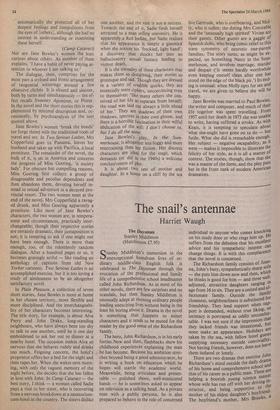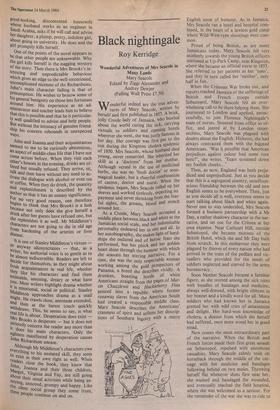The snail's antennae
Harriet Waugh
The Daysman
Stanley Middleton (Hutchinson £7.95) Stanley Middleton's immersion in the L./unexceptional humdrum lives of or- dinary middle-class English folk is celebrated in The Daysman through the evocation of the professional and family life of a comprehensive school headmaster called John Richardson. As in most of his other novels, there are few surprises and no scandals, but then Stanley Middleton is unusually adept at showing ordinary people leading unexciting lives without being in the least bit boring about it. Drama in the novel is something that happens to minor characters and it tends to be muted for the reader by the good sense of the Richardson family.
The hero, John Richardson, is in his early forties.Now and then, flashbacks show his childhood experiences explaining the man he has become. Because his ambition stret- ches beyond being a good administrator, he is writing a book on education which he hopes will startle the academic world. Meanwhile, being articulate and presen- table — polished shoes, well-manicured hands — he is sometimes asked to appear on television as a talking head. As a private man with a public persona, he is also prepared to behave in the role of concerned
individual to anyone who comes knocking on his study door or who rings him LIP. He suffers from the delusion that his excellent advice and his sympathetic interest can change things. It is with this complacency that the novel is concerned.
The Richardson family consists of Joan- na, John's busy, sympathetically sharp wife — she puts him down now and then, which he thinks is good for him — and three well" adjusted, attractive daughters ranging in age from 16 to six. They are a united and af- fectionate family. Outside the fairalY closeness, neighbourliness is substituted for friendship. They lend support when sup- port is demanded, without true liking, so intimacy is portrayed as oddly uncomfor- table. I was not sure if the impression that they lacked friends was intentional, but none make an appearance. Holidays are taken by the sea, with fellow hotel guests supplying necessary outside conviviality. Not having friends, however, does not leave them isolated or lonely. There are two dramas that exercise John Richardson's mind outside the daily drama. of his home and comprehensive school and that of his career as a public man. These are helping a boorish young science master whose wife has run off with her driving in- structor, and being supportive to the mother of his eldest daughter's boyfriend. The boyfriend's mother, Mrs Brooks, a
good-looking, discontented housewife whose husband works as an engineer in Saudi Arabia, asks if he will call and advise her daughter, a plump, pretty, indolent girl, about going to university. He does and the girl promptly kills herself.
One of the points of the novel appears to be that other people are unknowable. Why the girl kills herself is the nagging mystery of the story. Then there is Mrs Brooks's in- teresting and unpredictable behaviour which gives an edge to the well-intentioned, uncomplicated niceness of the Richardsons. John's main character failing is that of presumption. He wishes to bestow some of his general benignity on those less fortunate around him. His experience as an ad- ministrator and teacher leads him to believe that this is possible and that he is particular- ly well qualified to advise and help people. But without the intimacy of genuine friend- ship his concern rebounds in unexpected ways.
John and Joanna and their acquaintances seemed to me to be curiously abstemious, an aspect of middle-class life that I have not come across before. When they visit each other's houses in the evening, drinks are of- fered but usually refused. They arrive, sit, talk and then leave without any need to ac- tivate the dialogue with alcohol or even tea or coffee. When they do drink, the quantity and replenishment is described. by the author so that it has an uneasy significance. For no very good reason, one therefore begins to think that Mrs Brooks is a lush because not only does she give herself a drink after her guests have refused one, but she replenishes it as well. Mr Middleton's
characters are not going to die in old age from hardening of the arteries or liver disease.
It is one of Stanley Middleton's virtues — oranyway idiosyncrasies — that, as a Writer, his authorial voice is so gentle as to be almost indiscernible. Readers are left to decide for themselves, as they might about fresh acquaintances in real life, whether they like his characters and find them estimable, amusing, dreary or what have
You. Most writers highlight drama whether is tt emotional, social or political. Stanley
Middleton approaches drama as a snail might. He crawls close, antennae extended, and then at the barest touch quickly withdraws. This, he seems to say, is what real life is about. Desperation does exist Mrs Brooks is desperate — but it does not seriously concern the reader any more than
does his main characters. Only the ugliness manifested by desperation causes John Richardson unease.
Although Mr Middleton's characters owe everything to his unstated skill, they seem to exist in their own right as well. When readers close the book, they know that John, Joanna and their three children, INIargot, Virginia and Fay, are still going about their usual activities while being an- noying, annoyed, grumpy and happy. Like
these people continue on and on.











































 Previous page
Previous page